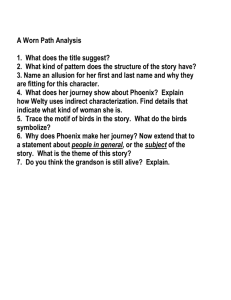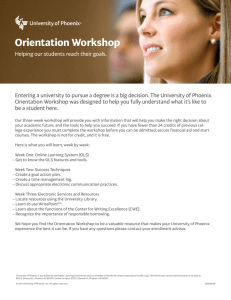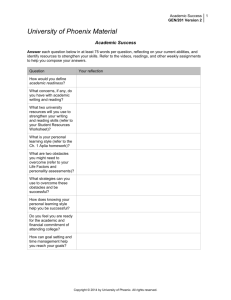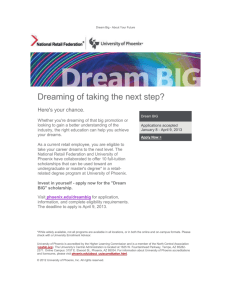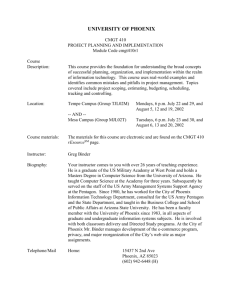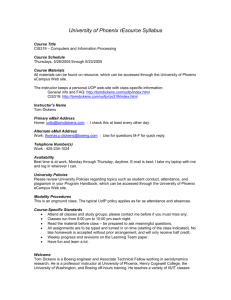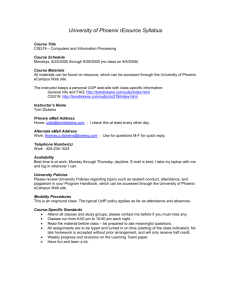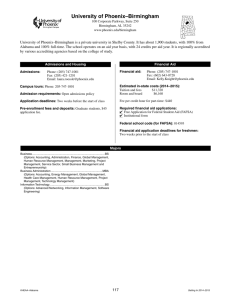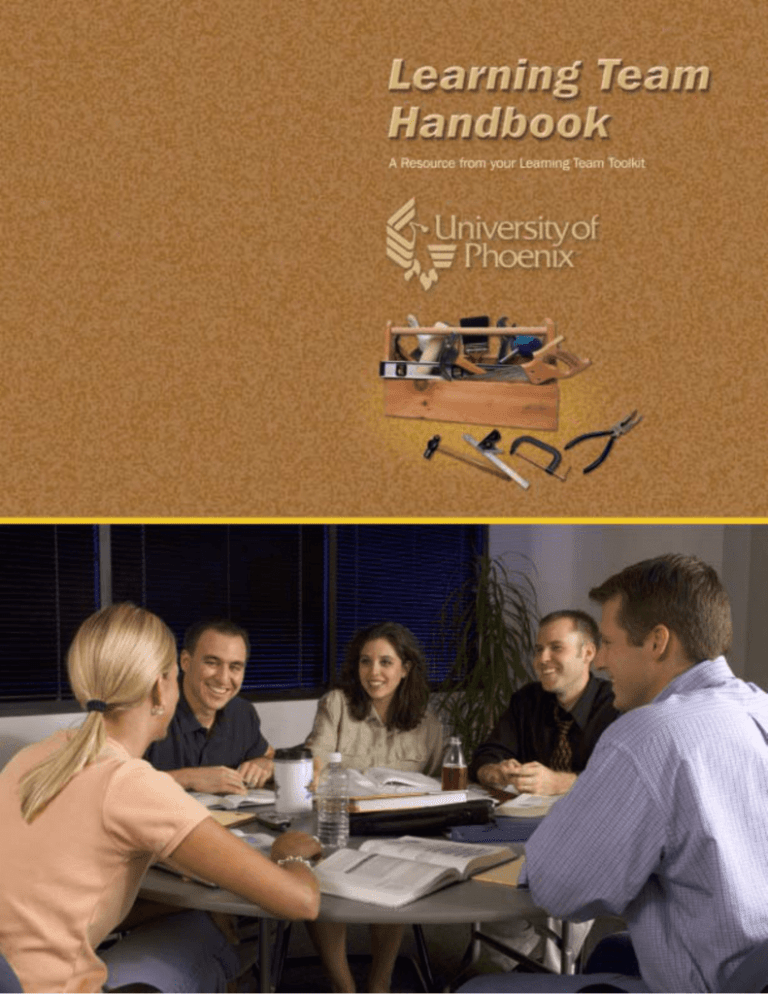
Copyright © 2002, 2003, 2004 University of Phoenix.
All rights reserved.
The text of this publication, or any part thereof, may not be reproduced or transmitted in any form or
by any means, electronic or mechanical, including photocopying, recording, storage in an information
retrieval system, or otherwise, without prior permission of University of Phoenix, Central
Administration Academic Affairs.
Contents
Learning Team Handbook .................................................................1
Learning Teams and University of Phoenix...................................................... 1
Purposes......................................................................................................... 1
Description of Learning Teams........................................................................ 2
Team Size........................................................................................................ 2
Membership Requirements ............................................................................. 2
Learning Team Time and Meeting Requirements ............................................ 2
Attendance Requirements ............................................................................... 2
Appropriate Team Meeting Locations.............................................................. 3
Team Formation .............................................................................................. 3
Team Charter .................................................................................................. 3
Learning Team Log ......................................................................................... 4
Faculty Role .................................................................................................... 4
Student Responsibilities.................................................................................. 4
Grading ........................................................................................................... 5
Dealing with Team Conflict.............................................................................. 5
Team Learning ................................................................................................ 5
Contents
iii
Learning Team
Handbook
LEARNING TEAMS AND UNIVERSITY OF PHOENIX
Since the University’s founding more than a quarter-century ago, Learning Teams have been an essential
element of our Teaching/Learning Model. University of Phoenix Founder, Dr. John Sperling, recognized the
value of teams in both academia and the workplace long before these benefits became widely known and
accepted. Dr. Sperling believed—and subsequent research has confirmed—that collaborative learning groups
serve several essential functions that are especially beneficial to working adult learners. As a result, the
University’s faculty continues to mandate the use of Learning Teams across the curriculum and in every
academic program.
PURPOSES
Learning Teams provide the following benefits:
•
Create collaborative learning environments in which working adults can share the practical knowledge that
comes from life and work experiences.
•
Allow students to broaden and deepen the understanding of concepts explored in the classroom.
•
Serve as laboratories through which students develop into effective leaders and members of workplace
teams.
•
Improve the quality of group projects and assignments.
•
Serve as vehicles for reflection, by which adult students make sense of and apply new knowledge.
•
Provide a sense of community and support that is invaluable in helping working adults cope with the
challenge of balancing school with other life demands.
Learning Team Handbook
1
DESCRIPTION OF LEARNING TEAMS
Learning Teams are small, intact groups of students formed at the beginning of each course from the larger
cohort. Teams meet weekly between course workshops to study together and to complete group assignments
and projects.
TEAM SIZE
Learning Teams are generally comprised of between three and six members. Research with Learning Teams
suggests that they work best when they are made up of four or five members. Larger teams become unwieldy
and difficult to coordinate while smaller teams usually lack the resources to do a thorough job.
MEMBERSHIP REQUIREMENTS
All University of Phoenix students attending courses in on-ground programs are required to be members of
Learning Teams. No “single-member” teams are permitted.
In the event that a student’s team situation is compromised by attrition (i.e., other students
withdraw from the class), the facilitator can and should place the student into another existing
Learning Team. Similarly, a facilitator may take appropriate action to balance the size of existing
teams. For example, if all parties are agreeable, the faculty member may move one member from
a team of five to a team of two.
In circumstances in which a team member is evicted from his/her learning team due to
performance issues and/or participation (see Dealing with Team Conflict below), the facilitator
must require the student to petition for membership to another team. Failure to join a team will
result in the student being prevented from submitting assignments and earning grades for
Learning Team participation for the duration of the class. In such a circumstance, the student
should be encouraged to discuss his/her options with an Academic Counselor.
LEARNING TEAM TIME AND MEETING REQUIREMENTS
Learning Teams meet weekly between course workshops. In standard three semester-credit undergraduate
courses of five workshops, teams should meet together between workshops for approximately five hours per
week. In standard three semester-credit graduate courses of six workshops, teams should meet together each
week between workshops for approximately four hours per week. (Note: A small number of courses offered by
University of Phoenix may differ in the number of credit hours and workshops. Please consult the rEsource
page and the faculty member’s syllabus for Learning Team requirements for those courses).
Virtual and teleconference meetings may be appropriate substitutes for some of the activities normally done
face-to-face. Content and team objectives for the week need to be taken into account when decisions to meet
other than face-to-face are made.
AT T E N D A N C E R E Q U I R E M E N T S
Students are expected to attend team meetings and be active participants in the team’s activities. Students will
be given the opportunity to evaluate the contributions of each team member to the accomplishment of team
goals.
Learning Team Handbook
2
A P P R O P R I AT E T E A M M E E T I N G L O C AT I O N S
When meeting face-to-face, Learning Teams are required to select sites for Learning Team meetings that are
conducive to learning. The following are considered acceptable: University of Phoenix classrooms and study
rooms; local, city or state libraries; university or college libraries; company or corporate training or meeting
rooms. Student residences or other locations are acceptable if they meet the following criteria:
1.
Individual seating for each student
2.
A desk or flat writing surface for each student
3.
Adequate lighting to ensure the ability of each student to read
4.
A quiet environment with no ambient noise like loud music
5.
Adequate temperature control to allow for the comfort of each student
6.
Electrical and phone service to allow student access to the University's library services and other online
resources
7.
Adequate restroom facilities for both genders
8.
Adequate parking for student convenience
As indicated earlier, virtual and teleconference meetings may be appropriate substitutes for some of the
activities normally done face-to-face.
T E A M F O R M AT I O N
During the first workshop of each course, instructors will give students time to form Learning Teams,
exchange contact information, and schedule their first meeting time and place. When forming teams, students
often select members based on convenience factors such as geographical proximity to one another. While that
is one acceptable consideration, it is hoped that students will take into account other factors that would
strengthen the team and provide for a diversity of skills and knowledge. (See the Learning Team Toolkit for
ideas regarding other factors to consider).
In the customary University of Phoenix scheduling format, as one course ends another begins the following
week. Class “cohorts” often continue together on to the next course. Having become comfortable with one
another, members of many teams desire to continue together in the same teams in subsequent courses.
Additionally, individual team members sometimes choose certain task roles in their teams that represent areas
of personal strength and then go on to repeat those roles in ensuing courses.
In order to enhance the quality of learning that can come from Learning Teams, the University strongly
encourages teams periodically to disband and form new teams with other class members in order to
experience other points of view, learn to work effectively in a variety of team situations, and develop different
skills by taking on new roles.
TEAM CHARTER
During the first meeting of a Learning Team in each course, teams are required to complete a Team Charter
using the University’s Learning Team Charter form. This is to be completed by team members in a
collaborative process and a copy is to be submitted to the instructor at the second workshop.
Learning Team Handbook
3
Chartering is the procedure by which a team meets at the beginning of its process (in this case, a University of
Phoenix course) to describe its mission or task, set its goals, secure commitment by members to the
achievement of those goals, make its plans, and allocate its resources. It is a competency that is as important
to ensuring the success of workplace teams as it is for your University of Phoenix Learning Team. By learning
this valuable skill, you greatly increase the likelihood that your team will reach its objectives in an effective and
an efficient manner. It is also the means by which your team will minimize conflicts that come naturally in any
group process. This is accomplished as members work together to identify potential conflicts before they
occur and then decide together how they will be dealt with if and when they arise. One benefit of re-forming
teams regularly is that students will avoid the tendency for the chartering process to become rote or
perfunctory. Additional information on the chartering process and a Learning Team Charter template can be
found in the Learning Team Toolkit under the Toolkit Essentials Menu.
LEARNING TEAM LOG
During each face-to-face workshop, members of a Learning Team meet together to schedule their next
meeting time, duration, and place. This information is entered on a University of Phoenix Learning Team Log,
which is turned in to the faculty member at the start of the next class. As the team meets, the Log is used to
document the attendance of members and record the learning and process of the team.
FA C U LT Y R O L E
University of Phoenix faculty members play critical roles in enhancing the learning that results from the team
process. Faculty responsibilities include:
1.
Guiding students in the formation of their Learning Teams on the first night of a course.
2.
Reviewing Learning Team Logs upon submission.
3.
Reviewing Learning Team Charter forms and coaching teams on the improvement of their team process.
4.
Outlining team task and process expectations in the course syllabus and during the course.
5.
Evaluating team assignments and projects, including the relative contribution of individual team
members.
6.
Coaching teams in dealing with internal conflict.
7.
During a course, periodically (and briefly) allowing students to reflect on the team process and coaching
for team improvement as indicated.
STUDENT RESPONSIBILITIES
Membership in Learning Teams is an essential element of a University of Phoenix education. As members of
Learning Teams, University of Phoenix students have numerous opportunities to plan and execute various
aspects of group assignments and presentations. Contributions of individual members are often combined,
through collaborative processes, into cohesive work products that demonstrate team mastery of learning
objectives. Just as with their personal assignments, work submitted by individual members for team
assignments must represent original work. Similarly, the integrated work of the team submitted for team
assignments must represent original work. External material and references must be appropriately cited, in
accordance with the Code of Student Responsibility and Standards of Student Behavior found in the University
Catalog.
Learning Team Handbook
4
GRADING
Learning Team assignments and processes should generally comprise no more than one third of the total
grade for a course. The University encourages instructors not only to grade the assignment or project but also
to assess the degree to which each team member contributed to the outcome. This helps to mitigate conflicts
caused by disparity in participation of team members.
DEALING WITH TEAM CONFLICT
Helping students learn to manage interpersonal conflict and resolve disputes is a primary objective of the
Learning Team process. Learning Teams are intended to serve as laboratories in which University of Phoenix
students develop the skills necessary to serve as leaders and managers of workplace teams. Conflicts should
be dealt with in the following manner:
1.
The goal is for conflicts to be managed and disputes to be resolved within the context of the team itself,
just as teams would be expected to do in the workplace.
2.
The Team Chartering process is designed to help members practice their conflict management and
dispute resolution skills in a proactive way by encouraging them to identify potential conflicts beforehand
and agree together on a plan for dealing with those that arise.
3.
If conflicts do arise, team members should consult their Team Charter and deal with the dispute, as
outlined. If team members are unable to resolve the dispute by those means, they may contact the faculty
member who can provide additional coaching and feedback.
4.
As a final resort, the faculty member may choose to take an action he or she deems appropriate. In
deciding on an appropriate course of action, the faculty member may wish to consult with the Campus
College Chair or Director of Academic Affairs at their local campus.
TEAM LEARNING
Through the process of completing Learning Team Charters, Learning Team Logs, and class “team process”
discussions, students have the opportunity to reflect on the learning that has taken place in the context of their
team’s work together. The University encourages faculty and students to formalize the learning process of
reflecting back on the team’s process. We hope that students regularly will ask themselves (individually and as
teams) such questions as these: What has being a member of this team taught me about being a team leader
or team member at work? What did we do that was particularly effective? What could we have done differently
to improve the process/task? By consistently asking these questions, University of Phoenix graduates will
demonstrate the ability to work effectively as members and leaders of teams—a core competency employers
expect of leaders and managers.
Learning Team Handbook
5


